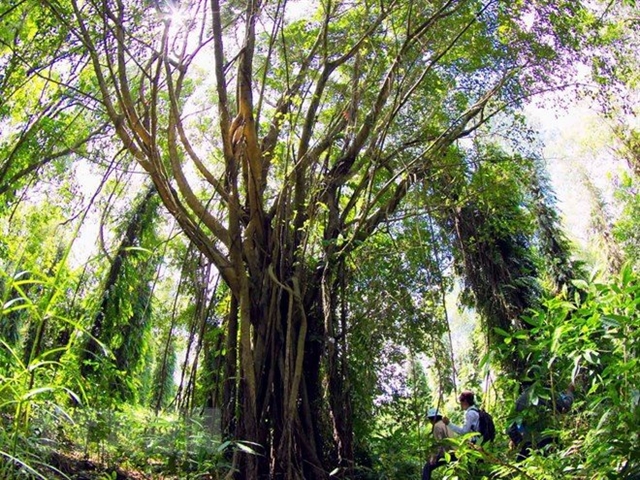 Environment
Environment

The International Union for Conservation of Nature has unveiled a global standard providing benchmarks for nature-based solutions (NbS) to global challenges.

|
| An ancient tree in U Minh Hạ National Park in southern Việt Nam.The IUCN has launched a Global Standard providing the first-ever set of benchmarks for nature-based solutions to global challenges. VNA/VNS Photo Duy Khương |
HÀ NỘI — The International Union for Conservation of Nature has unveiled a global standard providing benchmarks for nature-based solutions (NbS) to global challenges.
The new IUCN Global Standard will help governments, business and civil society ensure the effectiveness of NbS and maximise their potential to help address climate change, biodiversity loss and other societal challenges on a global scale, according to the UN body.
“The world is looking for durable and effective options to tackle global challenges such as climate change, food and water security, and now, economic recovery from the global pandemic. To this end, the new global standard for NbS is ideally placed to harness and accelerate the sustainable use of nature,” said IUCN’s Global Director for the Nature-based Solutions Group Stewart Maginnis.
“For NbS to fulfil their potential, we must ensure that the actions put in place today bring about the desired benefits for society and biodiversity. This global standard offers a rigorous, consistent and accountable framework that will help avoid any misuse and take nature-based solutions from the local to global scale,” said Stewart.
The concept of NbS – actions addressing key societal challenges through the protection, sustainable management and restoration of ecosystems, benefiting both biodiversity and human well-being – is increasingly being applied globally.
More than 130 countries, including Việt Nam, have already included NbS actions – such as reforestation, green infrastructure, sustainable agriculture and aquaculture, or coastal protection – in their national climate plans under the Paris Agreement.
However, not all actions labelled as NbS provide the anticipated benefits to both society and biodiversity, and the global potential of NbS is far from being fully realised.
“Until now, there has been neither consensus nor coherent guidance on how to design and implement NbS interventions that are capable of consistent delivery of benefits for people and nature,” said Angela Andrade, Chair of the IUCN Commission on Ecosystem Management.
“The contribution of the commission, in addition to input from over 800 experts and practitioners from 100 countries, has been to guide the Global Standard, ensuring that it is scientifically robust and applicable across a wide range of regions and scenarios,” she said.
The Global Standard for NbS has eight criteria and associated indicators that allow the user to assess the aptness, scale, economic, environmental and social viability of an intervention; consider its possible trade-offs; ensure transparency and adaptive project management, and explore links to international targets and commitments. It consists of a user guide and self-assessment tool.
Like many other countries, in Việt Nam, increased demand for NbS has led to misuse of the concept, where good intentions can harm nature and people.
In worst-case scenarios, misuse runs the risk of damaging biodiversity, eroding the nature that humans depend upon for services such as clean water and food.
For example, a tree-planting project using just one non-native species could result in poor soil biodiversity, making it more costly or impossible to sustain a diverse forest in the future.
Similarly, restoring a mangrove forest to reduce the risk of storm damage could be doomed from the start if upstream and downstream processes are not considered.
The standard helps to fill this gap, the IUCN said. — VNS




